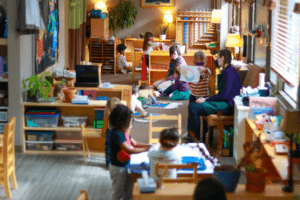
Montessori education deviates from traditional academics in the fact that the Montessori approach focuses on the entire person, including social, emotional, physical, and cognitive growth. A whole-person approach like this is a departure from the solely academic focus of many educational programs. When you consider a Montessori approach for your child’s education, you will find that the learning environment is different as well. Here are a few things you can expect from a Montessori classroom.
Various Ages in the Classroom
One hallmark of a Montessori learning environment is education by age range, not by grade. You’ll find a range of ages in each Montessori classroom, typically spanning around two or three years. That means that your preschooler may be with children up to around six years old, which allows them to learn skills and maturity markers from older children.
The same applies to school-age children, as six and seven-year-olds often share a classroom with children who are as old as 9. Montessori schools often even group the teenagers this way, with two groups dividing those who are 12 to 18, or three groups if you wish to break them up into two-year age spans.
Real-World Environment
Montessori education focuses on teaching independent self-discovery. To help foster this, Montessori schools size the furniture and the furnishings for kids. Child-sized furniture ensures that the children will be able to comfortably and confidently sit, play, and interact with everything in the room.
You will find coat hooks and cubbies that are low to the ground so that children take responsibility for hanging up their own coats and putting their own things away. This fosters independence and personal responsibility.
You may also notice a more home-like environment instead of a classroom atmosphere. The kitchen play area may have a laminate, wood, or tile floor so that children see real-world consequences of things falling on the floor and breaking. This teaches what to expect in their own homes as well.
You might find plants, lamps, bookshelves, and other similar accessories around the room as well. Montessori schools design each of these items for children to explore and interact with to learn their own boundaries as well as the boundaries of these objects.
A Loose but Consistent Schedule
At first glance in a Montessori classroom, you might think that there’s no routine and no schedule, but that it’s a free-for-all for the kids. That isn’t necessarily true. In fact, a Montessori classroom is child-led. So children are free to choose the zones they learn in during any given learning period. Children pursue what interests them because that interest is critical for learning and retention.
However, that doesn’t mean that the children spend the entire day just wandering. In fact, most Montessori classrooms will have a fixed schedule with a couple of hours in the morning spent at learning stations of choice, then playtime outside followed by lunch and rest time. Afterward, there’s often more learning time, whether it’s group learning or learning stations.
You may not see it right away, but if you watch a Montessori class long enough, you’ll see that there is clearly a schedule.
No Institutional Education Structure
The biggest thing about Montessori education is that it is a vivid departure from the institutional structured education approach. As a result, when you first walk into a Montessori classroom, you’ll notice that it does not contain desks.
You won’t see any desks for the children, nor will you see one for the teacher. The teacher in the Montessori classroom is intended to be viewed as a learning facilitator, not an authority figure or control factor.
These are some of the things you should understand about Montessori schools before you make the decision for your child. However, seeing truly is believing when it comes to the Montessori learning environment. Give us a call today at Miniapple International Montessori School for more information.

